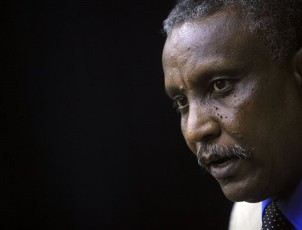Arman reaffirms commitment to talks with Sudan but under deal recognizing SPLM-N
September 4, 2012 (KHARTOUM) – The secretary-general of the rebel Sudan People’s Liberation Movement North (SPLM-N), Yasir Arman, responded in an interview with Sudan Tribune on Tuesday to questions raised about his group’s flexibility in negotiations with the government, explaining that they are committed to the talks but only on the basis of the 28 June agreement which recognizes the SPLM-N as a legal political force.

He added that the SPLM-N was trying to collect members of its negotiating team which he said would arrive in Addis Ababa at anytime to meet with the chief AU mediator Thabo Mbeki. Arman went on to reaffirm the SPLM-N commitment to negotiating a peaceful settlement to the conflicts in Blue Nile and South Kordofan as stipulated in the UN Security Council’s (UNSC) resolution number 2046.
Previous rounds of talks between the government and the SPLM-N were held indirectly through AU mediators and failed to achieve any progress on the political. However the two sides signed an agreement on 4 August to allow the delivery of humanitarian assistance in the two states but the SPLM-N later accused Khartoum of hampering the implementation of the process and demanded that the assistance be delivered through neighbouring South Sudan and Ethiopia.
When asked about reports on the frustration of some UNSC member states with the supposed preconditions his groups made in the previous rounds of talks, Arman denied that his group was making any preconditions.
He, however, admitted that some countries were confused about the SPLM-N’s negotiating stance and attributed this confusion to the fact that the SPLM-N insists on negotiating on the basis of the framework agreement signed on 28 June last year in Addis Ababa between the SPLM-N’s chairman Malik Aggar and Sudan’s presidential assistant Nafie Ali Nafie before it was disavowed by President Al-Bashir.
The said agreement laid the foundation for new political and security arrangements in the two regions and included an article recognizing the SPLM-N as a legal political party. After withdrawing its commitment to the deal, the government in Khartoum banned the SPLM-N as a political party and later sacked Aggar from his position as the elected governor of Blue Nile State when the conflict spread there in late August 2011.
“The UNSC is asking us to refer to the 28 June agreement and this means the negation of the measures taken afterward by the [ruling] National Congress [Party] including the ban of SPLM-N activities” Arman told Sudan Tribune.
Arman said that the ban on SPLM-N is a political resolution made by the NCP and not the registrar of political parties who he described as being under direct orders from the NCP. He stressed that the SPLM-N was not making preconditions but rather demanding return to the way things were under the 28 June agreement, which also included clauses about the comprehensive solution of Sudan’s problems.
The SPLM-N figure strongly countered NCP’s accusations that his groups is not serious about reaching peace, saying that the NCP is the last to talk about seriousness after it placed obstacles in the implementation of the humanitarian agreement with the intent of starving half a million people to death. According to Arman, the way the NCP handled the humanitarian issue gives a clear indication of the lack of its seriousness in reaching a political settlement.
Arman also responded to NCP claims about the connection between the SPLM-N and the government of South Sudan, saying that while the SPLM-N was part of South Sudan’s ruling party before secession more than a year ago it is now an independent force.
“We are an independent movement and the problems of Sudan will only be solved by Sudanese people unless the NCP considers the areas where war is now raging as not parts of Sudan.”
Arman’s statements follows comments in which the head of the government’s delegation to the talks Kamal Obaid accused the SPLM-N of lacking the political will to reach a peaceful settlement to the conflicts.
(ST)
